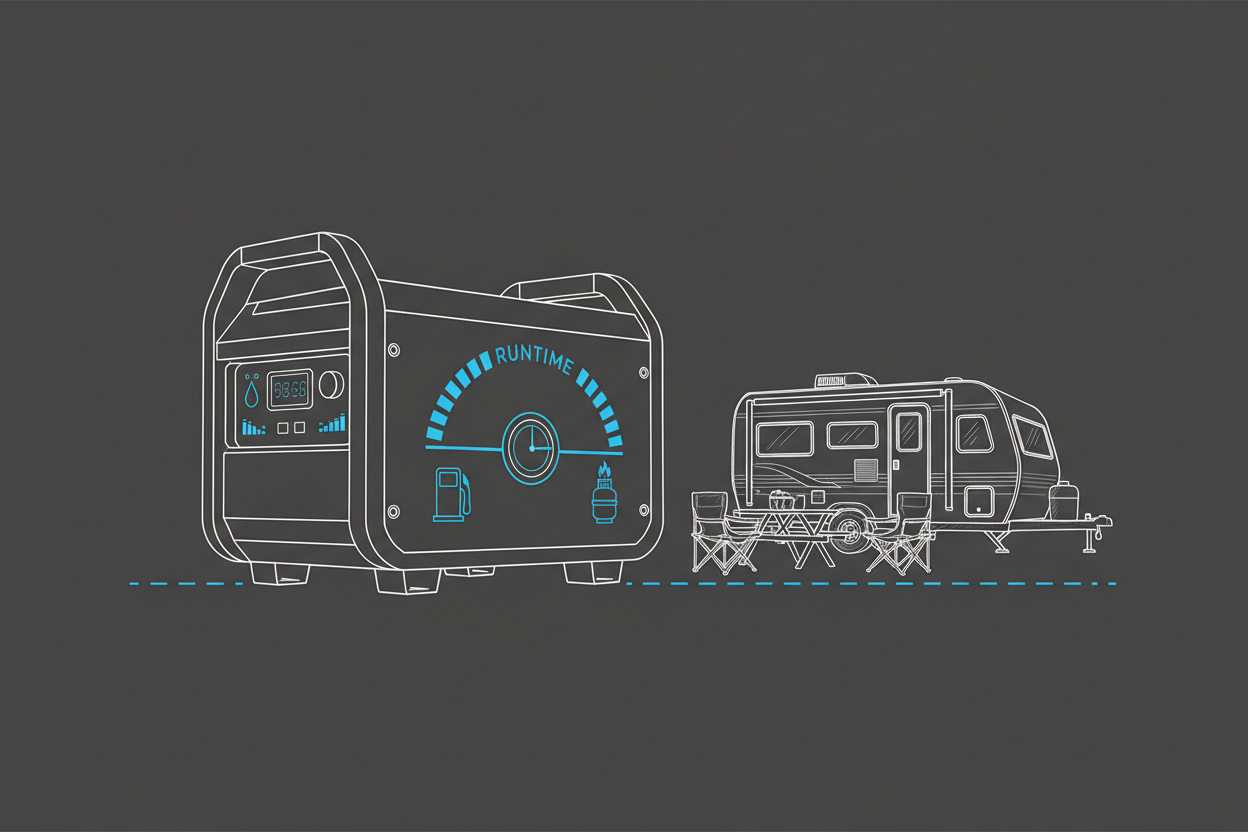RV Generator Runtime Guide: How Long Will Your Generator Run?
Understanding generator runtime is essential for planning RV travel, boondocking, and overnight air conditioning. Runtime varies based on generator size, load, fuel type, and whether you use eco mode. This guide explains what affects runtime and how to maximize efficiency.
Why Runtime Matters for RV Owners
Long runtime reduces the need for frequent refueling and provides more reliable cooling and appliance power. It is especially important when camping off-grid or running an RV air conditioner at night.

Factors That Affect RV Generator Runtime
Load Percentage
Generator runtime decreases as electrical load increases. Operating at 25–50% load provides the best efficiency, while running near maximum wattage shortens runtime significantly.
Fuel Type
Gasoline offers higher power output but shorter storage life. Propane provides cleaner combustion but slightly lower energy density. Dual-fuel generators offer flexibility for longer trips.
- Gasoline: typically longest runtime at heavy load
- Propane: more stable and cleaner, but 10–15% less runtime
Eco Mode
Eco mode lowers engine RPM when demand is low. This reduces fuel consumption, noise, and heat, extending runtime dramatically during light-load operation.
Typical Runtime for Common Generator Sizes
| Generator Size | Fuel Tank | Runtime (25–50% Load) |
|---|---|---|
| 2000–2400W inverter | 1.0–1.2 gal | 6–10 hours |
| 3500–4500W inverter | 2.2–3.5 gal | 8–14 hours |
| 5000–6500W inverter | 4.0–6.0 gal | 10–16 hours |
Larger inverter generators provide longer runtime because they operate at lower relative load for the same appliances.
Runtime When Running RV Air Conditioners
RV air conditioners significantly affect runtime due to high running wattage and repeated compressor cycles.
- 13,500 BTU AC: 1,100–1,500 running watts
- 15,000 BTU AC: 1,300–1,800 running watts
A 3500–4500 watt generator typically runs an RV AC for 6–10 hours on one tank, depending on outside temperature and additional loads.
How Propane Affects Runtime
Propane burns more cleanly but produces slightly less power per gallon equivalent. Expect 10–20% shorter runtime on propane compared to gasoline. However, many RVers prefer propane for convenience and long storage life.
Tips to Extend Generator Runtime
- Run eco mode whenever heavy loads are not required
- Turn off water heaters and microwaves when not in use
- Install a soft-start module to reduce AC compressor surge
- Keep air filters and spark plugs clean
- Use only the appliances you need
Small lifestyle changes can add hours of extra runtime during long stays or boondocking trips.
Parallel Generators for Longer Runtime
Two smaller generators running in parallel share the load. This lowers RPM, reduces strain, and extends total runtime while providing higher wattage for RV air conditioners.
Conclusion
Generator runtime depends on load, fuel type, tank size, and eco-mode usage. Most RVs achieve 6–14 hours of runtime on inverter generators, with longer durations possible at lighter loads. Understanding these factors helps RV owners plan reliable and efficient power for any campsite.
